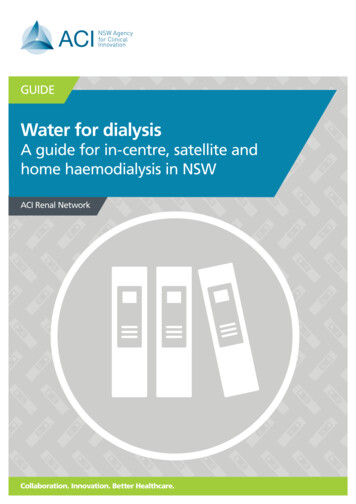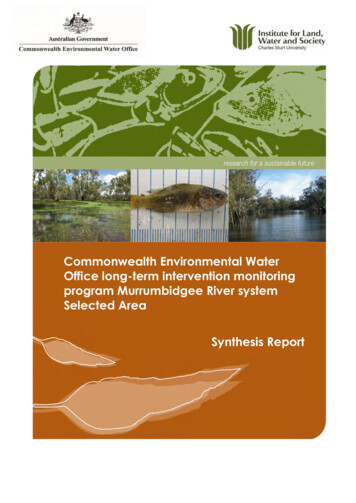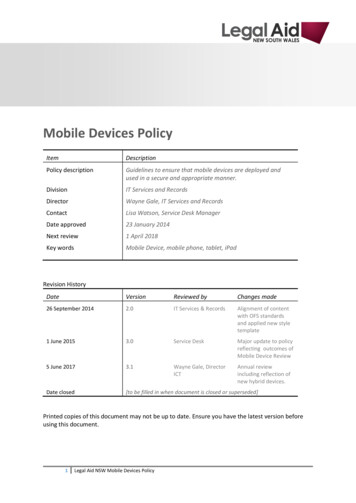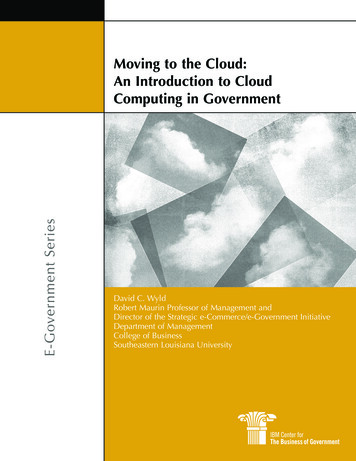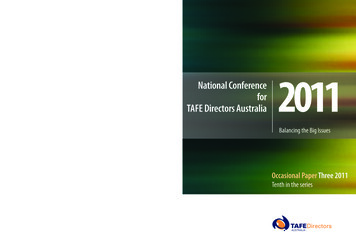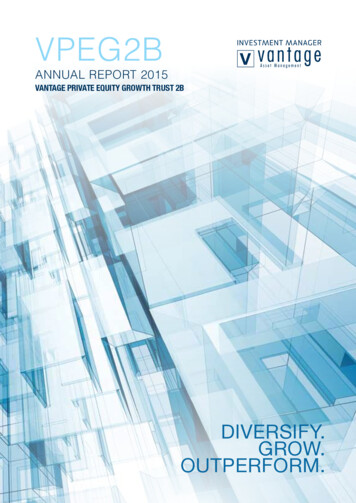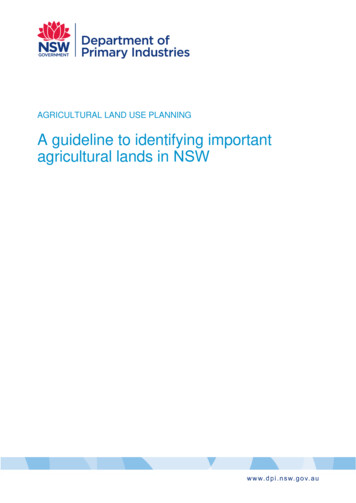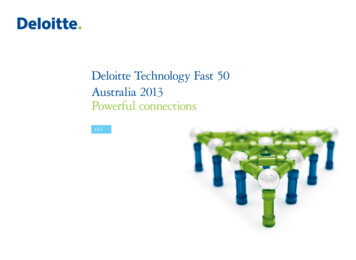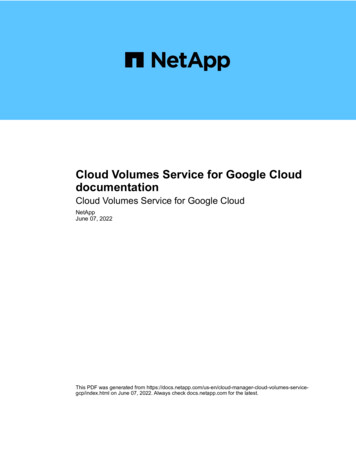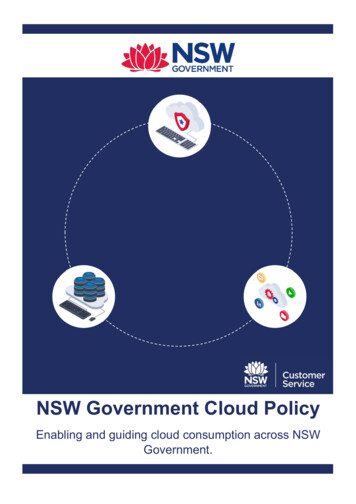
Transcription
NSW Government Cloud PolicyEnabling and guiding cloud consumption across NSWGovernment.
Contents1.Introduction .3a.Background and Context . 3b.What is the NSW Government Cloud Policy? .4c.Policy Outcomes .4d.Scope & Responsibility .52.Cloud Services.6a.Public Cloud Services .6b.Private Cloud Services .7c.Cloud Benefits .83.4.Cloud Service Selection .9a.Making Cloud Service Decisions .9b.Workload Considerations.10Cloud Service Procurement.12a. Procurement Requirements and Considerations .12b. buy.NSW .12c. Sourcing & Contracting .12d. Cloud Purchasing Arrangements (CPA) .135.Cloud Service Security .14a. Security in the Cloud .14b. Security Requirements and Considerations .14c. Information Classification, Labelling and Handling.156.Appendix .16a. Policy Development .16b. Further Resources .19c. Document Control .202
1. IntroductionThe NSW Government is making the strategic shift to cloud consumption through the use of public andprivate cloud services. The NSW Government Cloud Policy provides guidance and direction to NSWGovernment agencies in making use of public and private cloud services.NSW Government agencies must use this policy to ensure their consumption of cloud services isefficient, secure and financially sound. In doing so, this policy will enable alignment, consistency,optimal commercial outcomes, reduced risk and improved delivery of services to citizens across theNSW Government.The NSW Government Cloud Policy must be used by NSW Government agencies in understanding theavailable cloud services, determining the appropriate future usage of cloud services as well asprocuring and securing cloud services appropriately.The NSW Government Cloud Policy is presented in six sections:1. Introduction: outlines background and context, introduces what this policy is, the outcomes tobe achieved by following this policy, the scope of the policy and NSW Government agencyresponsibilities in following the policy.2. Cloud Services: defines the public and private cloud services available to NSW Governmentand outlines the benefits of consuming cloud services.3. Cloud Service Selection: provides guidance on selecting cloud services including workloadassessment considerations.4. Cloud Service Procurement: provides alignment to the existing procurement policies andprocurement guidance including through buy.NSW and NSW Government cloud contracts.5. Cloud Security: provides alignment to the Cyber Security Policy and identifies relevant securityobligations in consuming cloud services.6. Appendix: provides context on the development of this policy and further resources to guideagencies in their adoption and consumption of cloud services.a. Background and ContextThe NSW Government’s ICT and Digital landscape has evolved significantly over the last decadethrough delivery of the NSW Government Data Centre Reform and growth in the consumption of cloudservices.The NSW Government has continued to increase ICT service offerings through the introduction ofGovDC, implmentation of dedicated cloud network connectivity, development of the private cloudmarketplace, and introduction of mechanisms to support access to public cloud services. In parallel,NSW Government agencies have been increasing their consumption of public cloud services to supportresponsive delivery of innovative and scalable services to the citizens of NSW.Due to the large range of NSW Government agency use cases for IT services and the need to balancelegacy IT systems with more responsive delivery of contemporary services, the NSW Government ICTand Digital landscape has evolved to utilise both public and private cloud platforms.The NSW Government Cloud Policy combines the previous cloud and data centre policies to enablesecure, efficient and financially sound consumption of public and private cloud services. This policy was3
developed in collaboration with all NSW Government Clusters, to bring real world relevance on how theNSW Government agencies are consuming and planning to consume cloud services into the future.b. What is the NSW Government Cloud Policy?This policy aligns and modernises the Cloud Policy (2018), GovDC page (2018), and Data CentreReform Circular (2018) by consolidating them into a single policy. It provides linkage to the BeyondDigital Strategy and and NSW Government Cloud Strategy by aligning to the desired outcomes of bothstrategies. Furthermore, this policy will guide NSW Government agencies in their adoption andconsumption of cloud services by incorporating the latest changes in the technology, procurement andcyber security landscapes.The NSW Government Cloud Policy provides guidance and recommendations on the consumption ofpublic and private cloud services. The NSW Government Cloud Policy is ‘public cloud first’ meaningNSW Government agencies must make use of public cloud services as the default. Where public cloudservices are not suitable for agency requirements, private cloud services, provided through theGovernment Data Centres (GovDC) can be used by exception.The consideration for selection of cloud services is detailed in section 3.c. Policy OutcomesThe NSW Government Cloud Policy provides guidance and direction to enable NSW Governmentagencies to achieve the following outcomes:Security – adhering to this policy guidance, regarding usage of cloud services willensure NSW Government agency assets and data are secured.Consistency – NSW Government agencies receive common direction in theconsumption of cloud services, allowing them to make consistent usage of the publicand private cloud services.Modernisation – the NSW Government Cloud Policy guides NSW Governmentagencies in consuming cloud services to modernise their ICT and Digital servicedelivery. The policy enables modernisation through lineage to updated businessprocesses for procurement, security, and consumption of cloud services.Alignment – By defining and guiding the usage of cloud services, this policy ensuresalignment of cloud service consumption across the NSW Government in accordancewith NSW Government strategic objectives and priorities.Innovation – enables NSW Government agencies to consume new cloud capabilitiessuch as AI, machine learning, data analytics etc. By leveraging cloud services, the NSWGovernment will be able to keep up with services released by industry, without having tobuild and maintain each capability.Optimal Commercial Outcomes – NSW Government agencies will contribute tooptimising NSW Government commercial outcomes by using strategic partnerships withpublic cloud services providers, whole of government agreements and purchasingarrangements that have been established and referred to in this policy.4
d. Scope & ResponsibilityThe NSW Government Cloud Policy applies to all NSW Government clusters and agencies. It does notapply to State Owned Corporations, but it is recommended for their adoption.All NSW public sector Secretaries and Chief Executives are responsible for ensuring that this policy isapplied within their clusters and/or agencies. It is also recommended that compliance is regularlyreviewed by each agency’s Risk and Audit Committee. The NSW Government ICT and DigitalLeadership Group (IDLG) provides oversight for this policy.5
2. Cloud ServicesThis section of the policy defines cloud services available to NSW Government and identifies thebenefits of consuming cloud services.The following cloud services are available to NSW Government agencies: Public Cloud: Public cloud services are operated by third party cloud service providers, whoown, manage, and deliver computing resources (e.g. compute, storage) over the internet. Thesecomputing resources are delivered to multiple organisations.Private Cloud: The NSW Government provides private cloud services through GovDCmanaged and operated data centres.Dedicated Network and Cloud Connectivity: The NSW Government private cloud offersdedicated network interconnects between private cloud services and public cloud services.The diagram below depicts the cloud services available to NSW Government.Figure 1 ‐ NSW Government Cloud Servicesa. Public Cloud ServicesPublic cloud services are highly diverse, with varying models for consumption. The types of servicesthat can be consumed through public cloud include: Infrastructure as a Service (IaaS): Consumption of ICT infrastructure (server, storage,network, operating system) from a cloud provider. Resources are consumed on demand for aslong as they are needed. Platform as a Service (PaaS): Consumption of ICT platform to allow for the development,operation, and management of applications without the complexity of building and maintaininginfrastructure. Software as a Service (SaaS): On demand delivery of software applications, with cloudproviders hosting and managing the application and its underlying infrastructure.Public cloud services are consumed through global hyperscale providers such as Amazon WebServices (AWS), Microsoft Azure and Google Cloud Platform (GCP) as well as Australian providerssuch as Vault and Macquarie Government (to name a few). Each cloud provider has differing areas offocus, maturity, and speciality. A list of Government approved cloud services can be found on buy.nsw.The NSW Government Procurement Policy Framework outlines the steps to source cloud serviceswhich are further detailed in section 4 Cloud Service Procurement.6
b. Private Cloud ServicesPrivate cloud services enable NSW Government agencies to consume ICT infrastructure in a highlyefficient manner with a high standard for physical security. Private cloud services are delivered throughthe GovDC managed and operated data centres that were built in 2012. These services have evolvedto meet the changing needs of NSW Government agencies.Private cloud services include the following:1. Private CloudPrivate cloud offerings refer to cloud computing resources used exclusively by a single organisation,with services and infrastructure maintained on a private network. Where an NSW Government agencyhas taken the position to consume their infrastructure as a service, they may engage a vendor to build adedicated environment, within GovDC managed and operated data centres, on their behalf.2. Community CloudThe community cloud (marketplace) is a secure environment for the provision of as-a-service solutionsfrom a growing number of vendors, dedicated to NSW Government agencies. NSW Governmentagencies can acquire services through the ever growing ICT Services Catalogue, or by contacting theprivate cloud team at GovDC@customerservice.nsw.gov.au3. Dedicated Network and Cloud ConnectivityNSW Government private cloud facilities are supplier neutral and are open to all cloud service providersto offer cloud connectivity. A comprehensive array of suppliers is already on board. This serviceprovides: Access to dedicated Hyperscaler network linksServices supplied by AARNet for academia and associated entities.To access any of the approved NSW Government cloud services, go to buy.nsw.Suppliers that offer services through the NSW Government private cloud are included on buy.NSW butmust be procured following the requirements and considerations detailed in section 4 Cloud ServiceProcurement.4. Innovation SpaceThe Innovation Space is an incubator to develop a broader catalogue of private cloud services. Bylowering the commitment and investment required, the Innovation Space encourages cloud serviceproviders to build demonstration and test environments of their offerings and latest technologies forNSW Government agencies. After successfully proving their offering and entering a commercialarrangement with a tenant, the offering then transitions into the private cloud.5. Zone 3 PSPF PanelIn September 2020, GovDC will introduce colocation services certified to PSPF Zone 3. This will enablesupport of Government systems or workloads classified to PROTECTED level. For more information onData Classification standards, refer to section 5.c. Data Classification.6. Cloud Advisory and ProcurementThe Technology Services program can support agencies in the procurement and deployment of cloudservices through advisory and management services.For more information on private cloud services, please contact GovDC@customerservice.nsw.gov.au.7
c. Cloud BenefitsCloud services continue to enable transformational opportunities across NSW Government operations,enabling the delivery of citizen focused services anywhere, anytime, through the following benefits: Interconnected Ecosystem: The NSW Government private cloud currently hosts the majorityof NSW Government agency ICT infrastructure, making it the launchpad for agencies looking toconnect existing systems or workloads to public cloud services through dedicated networkconnectivity Collaboration: As a community of NSW Government agencies, the NSW Government privatecloud facilitates collaboration and sharing that is difficult to achieve when ICT and Digital servicedelivery is distributed Rapid Elasticity: The on demand model of Cloud allows NSW Government agencies to rapidlyscale up and down their infrastructure in line with end user and developer needs, allowing theNSW Government to keep up with growing and changing citizen demands High Availability: ICT services running in the cloud can be architected to be highly availableand resilient, ensuring fewer outages and less down time by leveraging constructs such asavailability zones and autoscaling. Access to New Capabilities: Cloud services provide the NSW Government the foundationsupon which to deploy more advanced capabilities such as artificial intelligence and machinelearning, as well as access to continual updates and service improvements Flexibility: By consuming cloud services, the NSW Government will have access to a range ofprogramming models, operating systems, databases, and architectures as well as supplierservices available through marketplaces provided by the public cloud services providers Automation: Platform and application automation can enable greater ease of managementacross ICT environments as well as self service provisioning capabilities Focus on Service Differentiation: Cloud consumption enables NSW Government agencies totransition away from the undifferentiated heavy lifting of managing infrastructure by consuming itas a service, allowing greater focus on transforming services for citizens Greater Security and Resiliency: Cloud environments can be configured to track changesusing logging and can make use of the latest security features to reduce the likelihood of cyberattacks and internal misconfiguration Cost Avoidance: Cloud services enable the NSW Government to pay for resources used, ondemand. This can enable upfront cost avoidance on infrastructure refresh and long term costsavings as workloads are optimised in the cloud environment Business Agility: Cloud services support more agile development and deployment practices,which can significantly reduce time to market if processes are updated to make use of rapidprovisioning Centralisation and Visibility: Strong governance of cloud services can help to centralise ICTenvironments and provide clearer visibility of consumption and costs.Whilst the benefits listed above are achievable through both public cloud and private cloud, they aremore attainable through public cloud. Public cloud service providers have developed the tools,commercial constructs, and services for Government agencies to architect, configure and govern cloudservices to realise these benefits.8
3. Cloud Service SelectionNSW Government agencies can consume public and private cloud services. This section will provideguidance on the selection of cloud services including making cloud service decisions and theconsiderations that will influence service selection.a. Making Cloud Service DecisionsNSW Government agencies must consider the four lenses of Strategy, Policy, Procurement and CyberSecurity to inform their cloud service decisions.Strategy Lens – is driven by the Beyond Digital Strategy, NSW Government Cloud Strategy, andagency cloud strategies. These strategic drivers state: The Beyond Digital Strategy states that NSW Government agencies must be shifting effortsfrom running ICT to transforming customer services The NSW Government Cloud Strategy states agencies must ‘Enable government-wide adoptionof public cloud services in an aligned and secure manner, to accelerate innovation, moderniseservice delivery and drive better outcomes for the citizens of NSW’ Agencies must develop their own cloud strategies and transition plans and submit these to theNSW Government ICT and Digital Leadership Group by 30th June, 2021 .Policy Lens – is driven by the NSW Government Cloud Circular and NSW Government Cloud Policy.These policy drivers state: All NSW Government agencies must make use of public cloud services as the default. Wherepublic cloud services are not suitable for agency requirements, private cloud services, providedthrough the Government Data Centres (GovDC) can be used by exception The use of public cloud services will apply to new agency ICT services and the materialreplacement or renewal of any existing services, platforms, and infrastructure Exemptions to the use of public cloud services will be reviewed in cases where public cloudservices are not suitable, as assessed through one or more of the following pre-requisites: costbenefit analysis, market scan of public cloud services, or security assessment In cases where ICT services cannot be consumed through public cloud, agencies will berequired to develop a briefing paper to request exemption, supported by these pre-requisiteassessments Exemption requests that are associated with a funding submission to the Digital Restart Fundwill be reviewed and approved by NSW Government Delivery and Performance Committee(DaPCo), and are to be submitted in conjunction with the Delivery and Performance Architecture(DAPA) checklist Exemption requests that are not associated with a funding submission to the Digital RestartFund will also be reviewed and approved by DaPCo and are to be submitted in conjunction withthe bi-monthly ICT assurance, cyber and procurement DaPCo submission Agencies must operate all private cloud services through GovDC.Procurement Lens – is driven by the NSW Government Procurement Policy Framework, NSWProcurement Board Direction and NSW Government agreements with cloud service providers. Theseprocurement drivers are:9
The Procurement Policy states that agencies ‘must evaluate cloud-based services whenprocuring ICT goods and services. The evaluation must be based on cost-benefit analysis andachieving value for money over the life of the investment.’ NSW Government agencies must make use of mandated Whole of Government Agreements(where they exist) Where no NSW Government agreements exist, agencies must use the relevant ICTProcurement contract framework to source ICT services.Cyber Security Lens – is driven by NSW Cyber Security policy, relevant legislative requirements(further explored in section 5 of this policy) and agency specific security plans. The cyber securitydrivers are: Agencies must meet cyber security requirements outlined in the NSW Cyber Security Policy Agencies must consider the protective marking of their data and implement securitymechanisms that meet these data classification requirements.b. Workload ConsiderationsThere are several prompts that signal when NSW Government agencies must consider their ICTplatform or service consumption options. These include: there is a major equipment/infrastructure refresh due; there is a major software refresh due; there is an emerging defined need for cross agency connectivity; there is an opportunity to consume an application through software as a service, or consolidateapplications across agencies or a cluster; existing solutions do not meet agency, staff or customer needs; and systems have limited support from staff or suppliers or are becoming increasingly difficult tosupport.When a NSW Government agency is seeking a new platform or service consumption option, they mustconsider the following factors: Accessibility: Cloud services must be accessible to WCAG 2.0 AA or above Capabilities: NSW Government agencies may have a need for specific capabilities (e.g.artificial intelligence, machine learning) which require the consumption of certain cloud services Cost-Benefit: An analysis must be conducted on the costs and benefits of moving a workload toa specific cloud service. Assessment must include value for money, fitness for purpose, aclearly defined business case (with benefits realisation reporting), the total cost of ownership(TCO), asset impact, organisational impact, and technical environment impact Technical and Network Requirements: With considerations such as enterprise architecture,bandwidth, response time, capacity, priority, availability, firewalling, automation, virtualisation,compatibility, interoperability, and configuration Risk Management: NSW Government agencies must undertake comprehensive riskassessments, including on network access, storage and maintenance of data or information andrecords held by third parties or suppliers10
Cyber Security: The agency must ensure that the management of the cloud service providermeets the security obligations as defined in the NSW Cyber Security Policy Skillsets: The ability of the NSW Government agency team to support the cloud service/s Privacy: Ensure the cloud service provider meets NSW information privacy laws and any otherapplicable privacy laws including:oPrivacy and Personal Information Protection Act 1998 (PPIPA)oGovernment Information (Public Access) Act 1998 (GIPA)oHealth Records and Information Privacy Act 2002 (HRIPA) Ownership: The NSW Government must retain ownership and control of all consumer datafrom the time it is created, and cloud service providers are not permitted to access or use anyconsumer data for purposes other than specified in the contract between the NSW Governmentagency and the cloud service providers Insurance: Cloud service providers should be appropriately insured including for public liability,product liability, workers’ compensation, cyber security, and professional indemnity. For furtherdetail of the insurance requirements refer to the relevant ICT Procurement contract frameworks Jurisdiction: contracts should nominate NSW as the exclusive jurisdiction of the agreement,including for any disputes. The State Records Act 1998 is the primary consideration regardingthe creating, management, protection and ongoing accessibility of records of public offices inNSW. Sending records for storage with, or maintenance by, suppliers based outside of NSW ispermitted – provided that an appropriate risk assessment has been conducted, and records aremanaged in accordance with all the requirements applicable to State records.11
4. Cloud Service ProcurementAs NSW Government agencies determine the appropriate mix of cloud services to suit their needs, theywill need to undergo procurement activities to source these cloud services. Procurement of cloudservices is governed by the NSW Procurement Policy Framework and NSW Procurement BoardDirection.This section will outline cloud service procurement considerations, the role of buy.NSW as well assourcing and contracting considerations.a. Procurement Requirements and ConsiderationsThe Procurement Policy Framework outlines the procurement process (Plan, Source and Manage).Buy.NSW providers guidance on navigating the procurement process including: Plan: Best practices including when and how to approach the market;Source: Finding the right supplier, going to market, and awarding the contract; andManage: Fostering a relationship so suppliers can excel while meeting obligations.The following are procurement requirements and considerations for cloud services: Agencies must use the ICT Services Scheme. The scheme offers a panel of prequalifiedsuppliers to provide a range of ICT solutions to assist NSW Government agencies and otherauthorised buyersAgencies should leverage buy.NSW, which provides a supplier list for initial market analysis.The supplier list is not exhaustive, with new suppliers continuing to be onboarded to the platformAgencies must develop a business case and funding request, inclusive of a value for moneyassessment, which must include consideration for cloud offerings, where appropriateAgencies should apply to funding from the Digital Restart Fund (DRF). The purpose of the DRFis to accelerate whole of government digital transformation. Cloud initiatives may be eligible forthe following DRF initiative categories:o State digital assets: solutions that create cost savings and consistent user experiencethrough increasing agencies’ use of core and common ICT componentso Legacy modernisation: initiatives that support agency digital innovation, ICTmodernisation, and reuses State Digital Assetsb. buy.NSWbuy.NSW is designed for NSW Government to make informed decisions when buying goods andservices. It offers a space for buyers and sellers of products and services to connect and do business. Buyers can search for, identify, and contact suitable suppliers; andSuppliers can register to do business with government, manage their profile and provideinformation on their goods and services.c. Sourcing & ContractingThe NSW Procurement Board Direction states that NSW Government agencies must use whole ofgovernment contracts for obtaining the goods or services to which those contracts apply, except wherespecific exemptions are provided by Procurement Board policies. These contracts must be used, wherethey provide the best value for money, as determined through an assessment of the cloud consumptionover the life of the contract. Where cloud consumption changes, these contracts, and their use, must bere-evaluated.The list of whole of government contracts can be found on buy.NSW.12
Where a suitable whole of government contract does not exist, agencies must use one of the followingProcure IT Framework components: Core& Contracts – may be used for low risk procurements with a contract value up to 1,000,000 (excl. GST); or Procure IT v3.2 – for all high risk procurements with a contract value over 1,000,000.The Department of Customer Service has also developed a new form of agreement for IaaS and PaaStermed the Digital.NSW Cloud Framework Agreement. This agreement is currently being used as thebasis for the Cloud Purchasing Arrangements (CPA) and will be incorporated into future revisions ofProcureIT. The Digital.NSW Cloud Framework Agreement may also be made available in future as analternative to ProcureIT v3.2 and Core& subject to approval by the Procurement Board. Furtherinformation on the CPA is outlined below.d. Cloud Purchasing Arrangements (CPA)In 2019 the Department of Customer Service commen
and outlines the benefits of consuming cloud services. 3. Cloud Service Selection: provides guidance on selecting cloud services including workload assessment considerations. 4. Cloud Service Procurement: provides alignment to the existing procurement policies and procurement guidance including through buy.NSW and NSW Government cloud contracts. 5.
